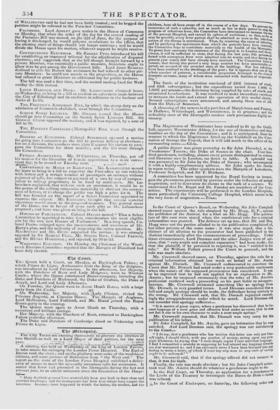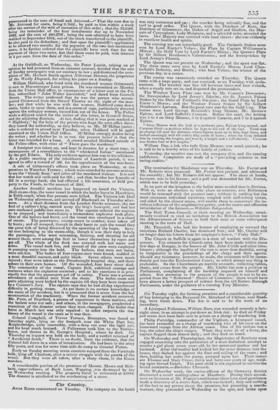In the Court of Queen's Bench, on Wednesday, Sir John
Campbell showed cause against the rule obtained by Mr. Hogg, 31. P., against the publisher of the Satirist, for a libel on Mr. Hogg. The particu- lars of this case were stated when the conditional rule for a criminal information was granted. The defence set up was, that Mr. and Mrs.
Hogg were not the parties alluded to in the publication complained of, but other persons of the same name : it was also urged, that a dis- claimer of all allusion to the prosecutor had been published in the
Satirist immediately after the commencement of proceedings. Under these circumstances, Lord Denman end the other Judges were of opi. nion, that" very ample and complete reparation" had been made; but
that the plaintiff, if he persisted in requiring it, was " entitled to his rule." Sir William Follett pressed the Court to proceed; and the rule was made absolute.
Mr. Cresswell showed cause, on Thursday, against the rule fore criminal information obtained last week on behalf of Mr. Austin against Mr. Disraeli. Mr. Cresswell endeavoured to convince the Court that Mr. Disraeli had acted under a very pardonable excitement when the nature of the supposed provocation was considered. It was to be regretted that be had not applied for an explanation to Mr. Austin ; but he supposed erroneously that the rules of Mr. Austin's profession rendered such a proceeding on his part liable to misappre- hension. Mr. Cresswell intimated something like an apology from Mr. Disraeli, in very guarded terms. Lord Denman considered thata full and ample apology should be made, the defendant being entirely in the wrong. Mr. Cresswell said, that Mr. Disraeli regretted exceed- ingly the misapprehension under which he acted. Lord Denman did not consider that apology sufficient-
" It is matter of great regret, where a gentleman has discovered that he ham used language of a most gross and offensive kind under an error, that he does not feel it due to his own character to make a most ample apology."
Mr. Cresswell repeated, that Mr. Disraeli was very sorry for the publication of his letter. Sir John Campbell, for Mr. Austin, gave no intimation that he vu satisfied. And Lord Denman said, the apology was not satisfactory to the Court-
" I do say, that a gentleman who has written this letter can only put tcup. self right, I should think, with any portion of society, acting upon any pna• elide whatever, by saying that 'I most deeply regret I ever used that language: I find I committed a mistake in supposing he had uttered any language towuds me that warranted it ; and I arn extremely sorry I have been betrayed into any feeling to write a letter, of which l must say any man in any state of society onyht to be ashamed.'" Cresswell said, that if the apology offered did not amount to that, it was his fault.
Filially, the rule was made absolute ; but Sir John Campbell under- took Ow Mr. Austin should do whatever a gentleman ought to do. In the Bail Court, on Thursday, an application for a mandamus to the Lords of the Treasury to investigate the Baron de Bodes claims was refused.
;i.111 the Court of Exchequer, on Saturday, the following order au
pronounced in the case of Small and Attwood—" That the sum due to Mr. Attwood for costs, being 9,766/., be paid to him within a week after the service of the writ of execution of this order ; that the 32,030/. being the remainder of the four instalments due up to November 1832, and the sum of 460,2791, being the sum admitted to have been realized to September 1834, out of the stock transferred to the plaintiffs, be also paid to the defendant; and that upon the plaintiffs's application to be allowed two months for the payment of the two last-mentioned sums, it be further ordered that the plaintiffs have such time for the payment of those two sums, but that those sums be paid, with interest at 4 per cent. from the date of this order."



























 Previous page
Previous page